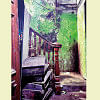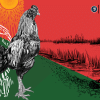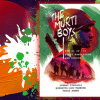“Baba, will I come with you now?”

Trigger warning: Contains referance to sexual violence.
"After months of torture and brutality, I suddenly wondered how I looked. There were no glass doors or windows in the room, let alone a mirror. What if we cut and kill ourselves!" said Tara, while narrating her story. On March 26, 1971, Tara was taken from her family by perpetrators. On the first night she was violated by her countryman, a Bengali, followed by six-seven others. After months of abuse, when Tara was finally free, she was relocated to Dhanmondi Women's Rehabilitation Centre. She waited weeks for her father to come get her. After Tara's father finally came, she asked him, "Baba, will I come with you?" Her hesitating father replied, "No, Ma, I can't take you home today. The house is getting fixed, your Mama has come too. Your sister Kaali will come with her husband. Once they leave, I'll take you home." Tara freed herself from her father's arms gently, "It's okay, Baba. You don't need to come here anymore."
I closed the book. It was 3 AM on a cold winter night. With hands shaking and vision blurred with tears, it took all my strength to flip the pages and finish Tara's story. And Meher Jan. And Rina. And then Shefali, Mayna, Fatema and Mina as well. These are all pseudonyms Neelima Ibrahim used to protect the war heroines' identities in her book Ami Birangona Bolchi. She failed to write the third part of this book, partly due to mental exhaustion and mostly because of our conservative mindset towards our war heroines.
After liberation, fearing humiliation by her own countrymen, Meher Jan left the country for Pakistan after marrying a soldier at the camp. Others who stayed back had to live with constant humiliation and judgement the rest of their lives, more often than not from their loved ones.
After Mayna's father was left humiliated and mortified by the groom's side when he went to talk about her marriage, Mayna's mother slapped her, "Why did you even come back? Couldn't you stay back in the hell where you came from? They killed so many people, how'd they miss you? How dare you step inside this house carrying that sinful body of yours?" Mayna left her home the next dawn. Fatema had to live the rest of her life with the brutal head injury she suffered at the camp and the psychological trauma that followed. Kids in her locality called her "Foti Pagli". Chapa, from Fatema's story, met a worse fate. Raped by hundreds of perpetrators, when she came back home, she was ostracised by her society. Her only crime? She was a Hindu girl raped by Muslims.
Each name echoed in my heart the rest of the night and ones after that. Tara was here, and so was Meher Jan, Rina, Mayna, Fatema and 2,00,000 more. Their sacrifice liberated this land, the earth under my bare feet. Ami Birangona Bolchi captures the harrowing tales of seven war heroines in its seven chapters. The soulful narration and gut-wrenching description make it one of the most impactful books ever written on our liberation war, because untold stories are often the most crucial ones.
Remind Ifti to be quieter at [email protected]

 For all latest news, follow The Daily Star's Google News channel.
For all latest news, follow The Daily Star's Google News channel. 








Comments